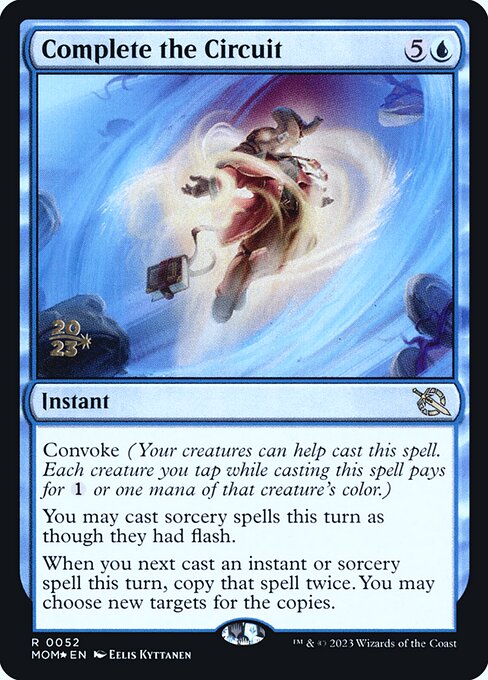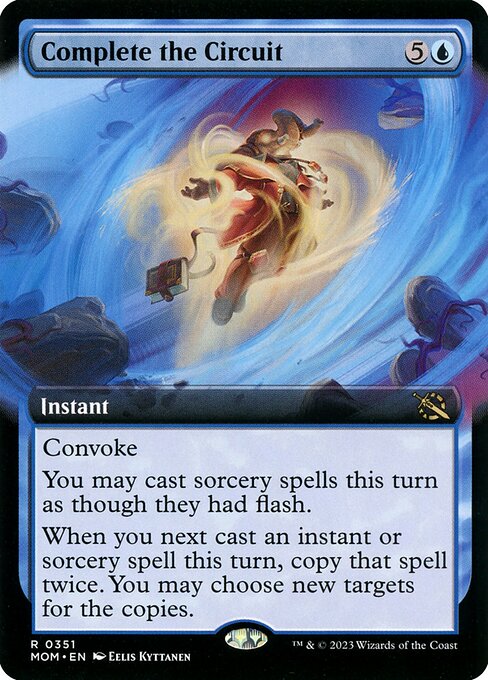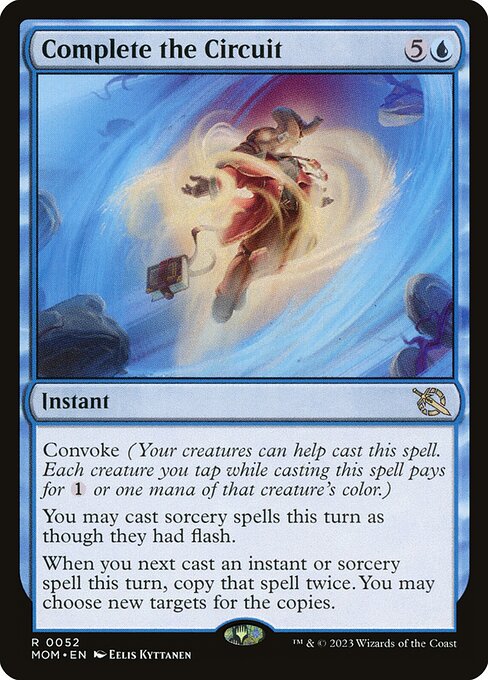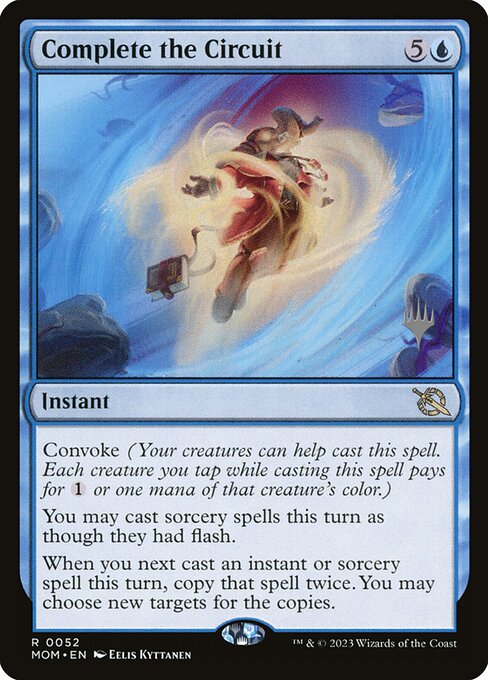Complete the Circuit
Instant
Convoke (Your creatures can help cast this spell. Each creature you tap while casting this spell pays for or one mana of that creature's color.)
You may cast sorcery spells this turn as though they had flash.
When you next cast an instant or sorcery spell this turn, copy that spell twice. You may choose new targets for the copies.
You may cast sorcery spells this turn as though they had flash.
When you next cast an instant or sorcery spell this turn, copy that spell twice. You may choose new targets for the copies.
standard
future
historic
gladiator
pioneer
explorer
modern
legacy
pauper
vintage
penny
commander
brawl
alchemy
paupercommander
duel
oldschool
premodern
Rulings
You may choose different new targets for each of the copies.
If the spell that’s copied is modal (that is, it includes a choice from a bulleted list of effects), the copy will have the same mode. A different mode can’t be chosen.
If you copy a spell, you control the copy. It will resolve before the original spell does.
If the spell that’s copied has an X whose value was determined as it was cast, the copy will have the same value of X.
The copy will have the same targets as the spell it’s copying unless you choose new ones. You may change any number of the targets, including all of them or none of them. If, for one of the targets, you can’t choose a new legal target, then it remains unchanged (even if the current target is illegal).
The “as though they had flash” effect applies only to casting sorcery spells. It does not, for example, change when you may activate abilities that can be activated “only as a sorcery.”
You can’t choose to pay any alternative or additional costs for the copy. However, effects based on any alternative or additional costs that were paid for the original spell are copied as though those same costs were paid for the copy.
If the spell has damage divided as it was cast, the division can’t be changed (although the targets receiving that damage still can). The same is true of spells that distribute counters.
A copy of a spell is created on the stack, so it’s not “cast.” Abilities that trigger when a player casts a spell won’t trigger.
If the spell that’s copied is modal (that is, it includes a choice from a bulleted list of effects), the copy will have the same mode. A different mode can’t be chosen.
If you copy a spell, you control the copy. It will resolve before the original spell does.
If the spell that’s copied has an X whose value was determined as it was cast, the copy will have the same value of X.
The copy will have the same targets as the spell it’s copying unless you choose new ones. You may change any number of the targets, including all of them or none of them. If, for one of the targets, you can’t choose a new legal target, then it remains unchanged (even if the current target is illegal).
The “as though they had flash” effect applies only to casting sorcery spells. It does not, for example, change when you may activate abilities that can be activated “only as a sorcery.”
You can’t choose to pay any alternative or additional costs for the copy. However, effects based on any alternative or additional costs that were paid for the original spell are copied as though those same costs were paid for the copy.
If the spell has damage divided as it was cast, the division can’t be changed (although the targets receiving that damage still can). The same is true of spells that distribute counters.
A copy of a spell is created on the stack, so it’s not “cast.” Abilities that trigger when a player casts a spell won’t trigger.
Rulings
You may choose different new targets for each of the copies.
If the spell that’s copied is modal (that is, it includes a choice from a bulleted list of effects), the copy will have the same mode. A different mode can’t be chosen.
If you copy a spell, you control the copy. It will resolve before the original spell does.
If the spell that’s copied has an X whose value was determined as it was cast, the copy will have the same value of X.
The copy will have the same targets as the spell it’s copying unless you choose new ones. You may change any number of the targets, including all of them or none of them. If, for one of the targets, you can’t choose a new legal target, then it remains unchanged (even if the current target is illegal).
The “as though they had flash” effect applies only to casting sorcery spells. It does not, for example, change when you may activate abilities that can be activated “only as a sorcery.”
You can’t choose to pay any alternative or additional costs for the copy. However, effects based on any alternative or additional costs that were paid for the original spell are copied as though those same costs were paid for the copy.
If the spell has damage divided as it was cast, the division can’t be changed (although the targets receiving that damage still can). The same is true of spells that distribute counters.
A copy of a spell is created on the stack, so it’s not “cast.” Abilities that trigger when a player casts a spell won’t trigger.
If the spell that’s copied is modal (that is, it includes a choice from a bulleted list of effects), the copy will have the same mode. A different mode can’t be chosen.
If you copy a spell, you control the copy. It will resolve before the original spell does.
If the spell that’s copied has an X whose value was determined as it was cast, the copy will have the same value of X.
The copy will have the same targets as the spell it’s copying unless you choose new ones. You may change any number of the targets, including all of them or none of them. If, for one of the targets, you can’t choose a new legal target, then it remains unchanged (even if the current target is illegal).
The “as though they had flash” effect applies only to casting sorcery spells. It does not, for example, change when you may activate abilities that can be activated “only as a sorcery.”
You can’t choose to pay any alternative or additional costs for the copy. However, effects based on any alternative or additional costs that were paid for the original spell are copied as though those same costs were paid for the copy.
If the spell has damage divided as it was cast, the division can’t be changed (although the targets receiving that damage still can). The same is true of spells that distribute counters.
A copy of a spell is created on the stack, so it’s not “cast.” Abilities that trigger when a player casts a spell won’t trigger.
Your collection? Your decks?
Want to manage your collection and/or create decks?



 0
0
 0.23€
0.23€

